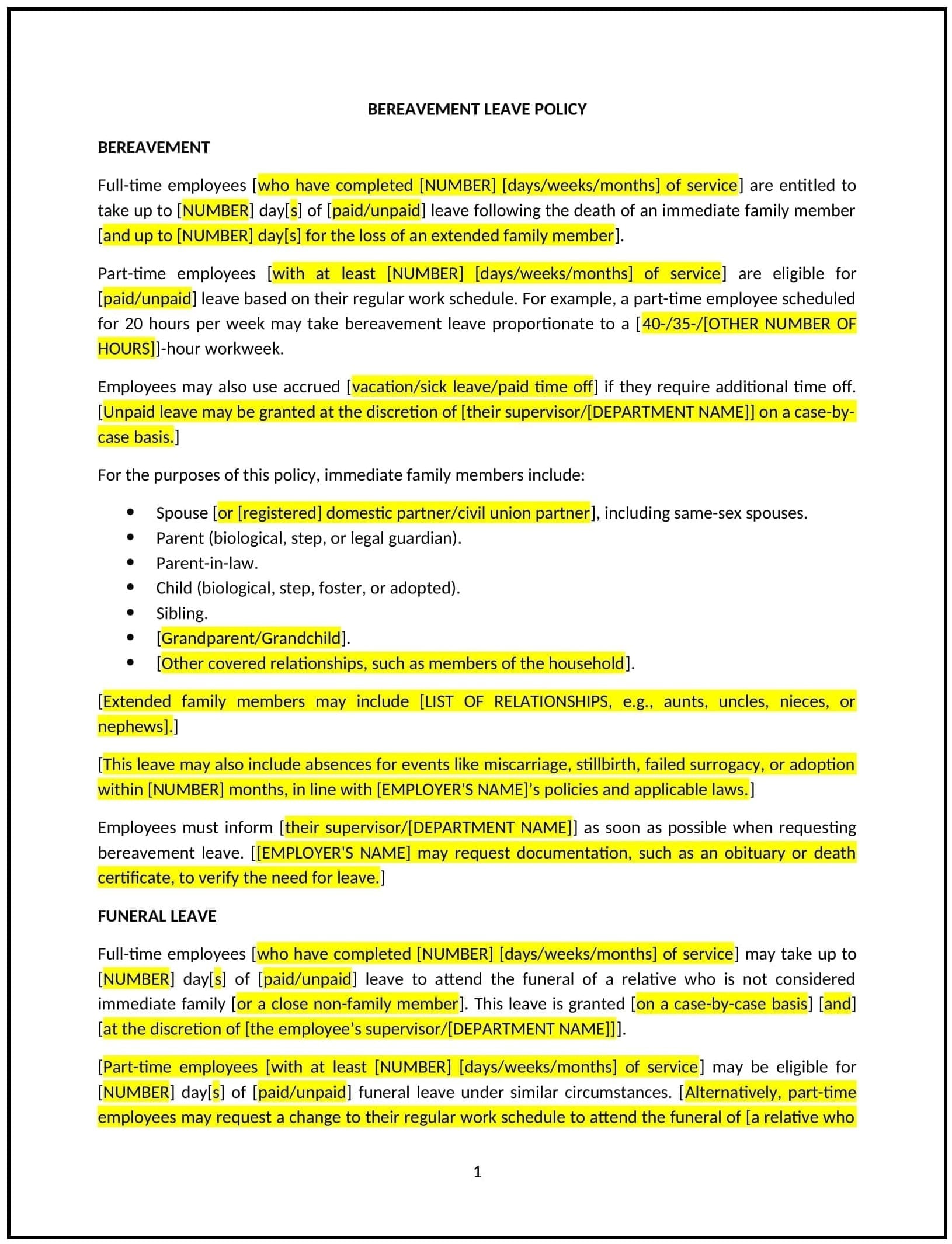Bereavement leave policy (New Mexico): Free template
Got contracts to review? While you're here for policies, let Cobrief make contract review effortless—start your free review now.

Customize this template for free
Bereavement leave policy (New Mexico)
This bereavement leave policy is designed to help New Mexico businesses provide employees with time off to grieve and manage affairs following the death of a close family member. It outlines the duration of leave, the process for requesting leave, and the types of relationships covered under this policy.
By adopting this policy, New Mexico businesses can support employees during difficult times, promote employee well-being, and create a compassionate and supportive workplace environment.
How to use this bereavement leave policy (New Mexico)
- Define eligible relationships: Clearly define which family members qualify under the policy, such as parents, siblings, spouses, children, and extended family, in line with New Mexico’s cultural norms and common practices.
- Set the duration of leave: Specify how many days of bereavement leave are available to employees based on the relationship to the deceased. Common practices include 3 to 5 days for immediate family members, with shorter leave for extended family.
- Address paid versus unpaid leave: Clarify whether bereavement leave is paid or unpaid, or if employees can use other types of leave (e.g., sick leave or vacation days) during this period.
- Set the process for requesting leave: Provide a clear procedure for employees to request bereavement leave, including how much notice they should give and what documentation (such as a death certificate) may be required.
- Include flexibility: Offer flexibility where possible, allowing employees to extend their leave if needed for funeral services or to handle personal matters following the death of a family member.
- Reflect New Mexico-specific considerations: Address any unique local practices or legal requirements regarding bereavement leave in New Mexico, such as particular provisions under state law or cultural considerations that may apply.
Benefits of using this bereavement leave policy (New Mexico)
Implementing this policy provides New Mexico businesses with several advantages:
- Promotes employee well-being: Supports employees during challenging times by providing them with the necessary time to grieve and manage personal matters without the added stress of work obligations.
- Enhances employee retention: Demonstrates that the company values its employees and their personal needs, which can lead to increased loyalty and long-term employee retention.
- Reduces absenteeism: By offering formal leave for bereavement, businesses can ensure that employees take the time they need to handle their grief and responsibilities, potentially reducing absenteeism in the future.
- Supports a compassionate workplace culture: Establishes the business as a caring employer that considers the personal needs of its workforce, contributing to a positive work environment.
- Aligns with New Mexico regulations: Adapts the policy to any specific state requirements or cultural sensitivities regarding bereavement leave.
Tips for using this bereavement leave policy (New Mexico)
- Communicate the policy clearly: Ensure that all employees are aware of the policy and know how to request bereavement leave when the need arises. This can be done through employee handbooks, onboarding materials, and regular reminders.
- Be flexible: Recognize that grieving processes vary, and provide employees with flexibility in terms of the length of time off if necessary. Offering additional unpaid leave or allowing employees to use accrued leave can show support.
- Maintain confidentiality: Respect employees' privacy by keeping details about their bereavement confidential. Only necessary personnel, such as HR, should be informed about the leave request.
- Document requests: Keep a record of bereavement leave requests for administrative purposes and to track usage of leave. However, be sensitive to the personal nature of the information involved.
- Review regularly: Periodically review the policy to ensure it remains relevant to New Mexico’s legal requirements, employee feedback, or changing business needs.